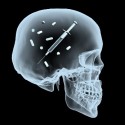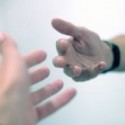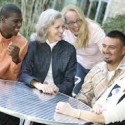Alcoholism remains a taboo issue
He seems to have it all. A tenured university professor in the Kansai region, fluent in English and partially conversant in Chinese, he is consulted by senior local business leaders seeking advice on doing business in the United States and Europe and has served on local government committees promoting international exchanges.
But the professor, who didn’t want his name revealed, has a secret — he’s an alcoholic. His addiction has nearly cost him his secure university position, forced him to cancel media appearances and, once, prevented his attendance at a conference in Paris, where he was due to deliver a keynote speech.
“Alcoholism is a disease. But Japanese society as a whole still doesn’t see it that way, and few people I work with know that I’m an alcoholic,” the 63-year-old educator said, adding he attends a Kansai chapter of Alcoholics Anonymous.
“The pressure to drink, either for business or social reasons, remains strong, especially among members of my generation. Heavy drinkers are admired for their strength and forgiven for their rude behavior, which is ignored the next day,” he said.
“In July 2007, Prince Tomohito was treated for alcoholism. The eldest son of Prince Mikasa and Princess Yuriko, he was long known for having alcohol problems. But his public admission was a surprise to many and of some concern to some in the Imperial Household Agency who worried about a negative public reaction,” he added.
On the other hand, former Finance Minister Shoichi Nakagawa’s problems with alcohol, which resulted in his resignation after an allegedly drunken appearance at a press conference in Italy, won little sympathy from the public.
Media reports indicated that politicians, bureaucrats and media elements who cover the Nagata-cho political center had known for years Nakagawa was a heavy drinker. But whereas Prince Tomohito finally admitted he had a problem and needed help, Nakagawa was unable to do so until he publicly embarrassed Japan.
Kurihama National Hospital in Kanagawa Prefecture, where Prince Tomohito sought treatment, opened the country’s first specialized ward for alcohol abuse in 1963. It is now Japan’s leading institution for treating alcohol addiction and one of 10 specialized treatment centers nationwide. In fiscal 2008, the center treated 1,195 new patients, while another 16,548 were repeat visitors.
Susumu Higuchi, deputy director of National Hospital Kurihama Alcoholism Center, said there has been little change in basic public attitudes toward alcoholism during the past couple of decades, with most Japanese seeing it is a social problem rather than a disease requiring medical treatment. At the same time, there appears to be less consumption of alcohol than in the past.
“Laws against drunk driving have toughened over the past decade or so, as people recognize the dangers of drinking before you get behind the wheel,” Higuchi said. “Overall, those in large cities like Tokyo and Osaka are drinking less than in the past.
“At the same time, certain groups, including women in their 20s, often drink heavily, while many members of the baby boom generation, which is now retiring in record numbers, find themselves out of work and with time and money on their hands to do more drinking,” he added.
Doctors and nongovernmental organizations involved in helping those with alcohol problems note public education campaigns and programs have had limited effect in raising awareness.
In 1992, the then Education Ministry ordered all schools to teach the harmful effects of alcohol in health education classes, but by 2002, according to a followup survey, less than half of those polled knew what the signs of alcoholism are.
A survey presented by Higuchi in February revealed how extensive alcohol abuse is in Japan. Higuchi estimated that in fiscal 2003, people aged 15 and above on average consumed about 7.7 liters of alcohol annually. Nearly 8.6 million people consumed more than 60 grams of alcohol daily, which is considered excessive.
Higuchi estimated there were 800,000 people who fit the clinical definition of an alcoholic and a further 4.4 million suspected of being alcoholics.
Symptoms of alcoholism include a strong desire to drink, an increased tolerance that leads to greater consumption, an inability to control one’s intake, ignoring other pastimes, and continuing to drink, despite knowing it is the cause of various psychological and personal problems.
If someone displayed at least three of these symptoms over the past year, or more than three symptoms at the same time within a one month period, they would be considered alcoholics in need of treatment.
As to Japan’s public policy regarding alcohol, there are warning labels on alcoholic beverages and restrictions on advertising them. But these are largely voluntary measures, and Higuchi noted there are no legal restrictions on TV ads, although many of those who advertise on TV have created essentially voluntary restrictions.
Alcohol is not legally available to minors, in other words to those under 20. But there are no restrictions on small shops that sell liquor. Nor, as in certain U.S. states, are there restrictions on the times or days of the week when booze can be sold.
The Kansai professor agreed less advertising and some restrictions on alcohol sales may at least help deter heavy drinking. But what is first needed is broader public education and public sympathy for those who suffer from alcoholism, he said.
Higuchi noted that although Prince Tomohito’s admission and Nakagawa’s problems made headlines, they did little to change basic attitudes. Still, he added, the right kind of public figure can often take the lead in changing public perception.
“In America, (the late) President Gerald Ford’s wife, Betty, admitted she was an alcoholic, and her admission won her lots of sympathy, started a serious public health debate about alcoholism, which helped make it less taboo, and led to the creation of the Betty Ford Clinic for alcoholics,” Higuchi said.
“That hasn’t happened in Japan yet,” he added.
source: Japan Times


